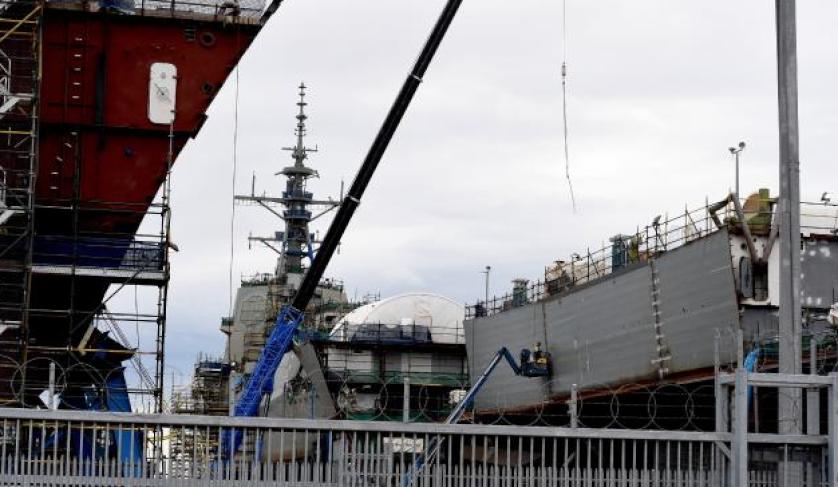The Coalition has hit back at Labor following comments made by Opposition Leader Bill Shorten during a Leaders’ Debate regarding Labor’s history of Defence expenditure when last in government, as the election race enters its final week.
To continue reading the rest of this article, please log in.
Create free account to get unlimited news articles and more!
Following an explosive Leaders' Debate late last-week, Prime Minister Scott Morrison has returned salvo to Labor's claims about its record on Defence expenditure through the Rudd/Gillard/Rudd years.
In a statement, Minister for Defence Christopher Pyne said, "Bill Shorten desperately tried to claim credit for Labor for the [Hobart Class] Air Warfare Destroyer and [Canberra Class] Landing Helicopter Dock programs when both projects were decided and contracted by the Howard government."
Both the Prime Minister and Defence Minister were quick to point out that under the previous Labor government, Defence expenditure had been cut by over 10 per cent in real terms in 2012-13 – resulting in Defence investment to fall to its lowest levels since 1938 as a proportion of GDP.
"Over $18 billion was gutted from Defence funding, weakening our Defence Force, softening our borders, discouraging investment, and setting back Australia’s defence industry," the Coalition's media release added.
Throughout the election campaign, the Coalition has sought to reaffirm its position as "the party of defence and defence industry" as it pushed to remind voters of the achievements for defence industry under the Coalition.
A Minister Pyne and Defence Industry Minister Linda Reynolds release explained, "Labor’s failure to commission these important projects led to the workforce ‘valley of death’ and the loss of thousands of jobs in Adelaide and across the country. The Coalition has acted decisively since 2013 to increase Defence spending, build up our military capability, and create tens of thousands of jobs for Australians through our revitalised sovereign defence industry."
This rebuttal comes days after announcements by both the government and opposition committing to increased domestic naval shipbuilding programs – with a focus on supporting the growth of the industry in Western Australia.
The government has drawn on the announcements outlined in the 2016 Defence White Paper (DWP) and supporting Integrated Investment and Naval Shipbuilding Plans to set the tone for its record for managing the defence portfolio – focusing on responding to regional tensions and forging a path forward, following nearly two decades of 'valleys of death', cost and delivery overruns and shrinking defence budgets.
Key to this positioning was a number of key announcements, including:
- Signing the $35 billion SEA 5000 Hunter Class future frigate program;
- Signing the $5.2 billion LAND 400 Phase 2 Boxer Combat Reconnaissance Vehicle (CRV) program; and
- Signing the $50 billion SEA 1000 Attack Class future submarine program.
"Labor has announced a Force Posture Review, which is simply a cover for their plan to cut Defence spending and walk back on the Coalition’s $200 billion commitment to Defence capability over the next decade ... Labor has already announced they will again delay the Attack class submarine program, placing at risk the defence of our nation and the creation of thousands of jobs," the Coalition release added.
In response
Labor outlined its dedication to Australia's defence industry, committing to the construction of three major naval ships in WA – echoing that made by the Coalition – with Labor adding a commitment for each Australian-owned defence industry company that:
- Employs more than a thousand people globally in defence industries;
- Is high tech in nature and is producing intellectual property of significant value in Australia; and
- Earns the majority of its revenue from defence industry exports,
Will be designated as an Australian defence industry prime.
The opposition has also outlined that a Labor government will actively work with each Australian defence industry prime to ensure its industrial capability is:
- At a level that enables it to produce products that are competitive in the ADF’s procurement process;
- Developed to enhance its export opportunities, actively backed by government and Defence; and
- Maintained in Australia.
Finally, Shorten and Marles announced the first review of Australia's force posture since 2012. Labor has recognised that "the world looks different from when Australia’s last force posture review was undertaken by the former Labor government in 2011-12. We now face the most challenging set of strategic circumstances since the Second World War".
Labor said the review would consider whether the ADF personnel, infrastructure and assets are correctly geographically positioned to meet our future strategic challenges.
Since the last Force Posture Review, there have been two Defence White Papers, and a bi-partisan commitment to spending 2 per cent of GDP on Defence, including the acquisition of 72 joint striker fighters, 12 submarines, 12 offshore patrol vessels, nine frigates, 21 pacific patrol boats and 211 combat reconnaissance vehicles.
The Coalition reinforced its reminder to Australia's defence industry, saying, "The Coalition government has spent the last six years restoring Labor’s unprecedented cuts to Defence funding and reversing their failure to commit to a single Australian-built naval vessel. We have restored confidence in our defence industry and grown our high-tech manufacturing sector ... Labor must commit to the Coalition’s defence industry policies, which are seeing Australia’s defence industry boom and thousands of new high-paying jobs being created."
Stephen Kuper
Steve has an extensive career across government, defence industry and advocacy, having previously worked for cabinet ministers at both Federal and State levels.

 Login
Login








